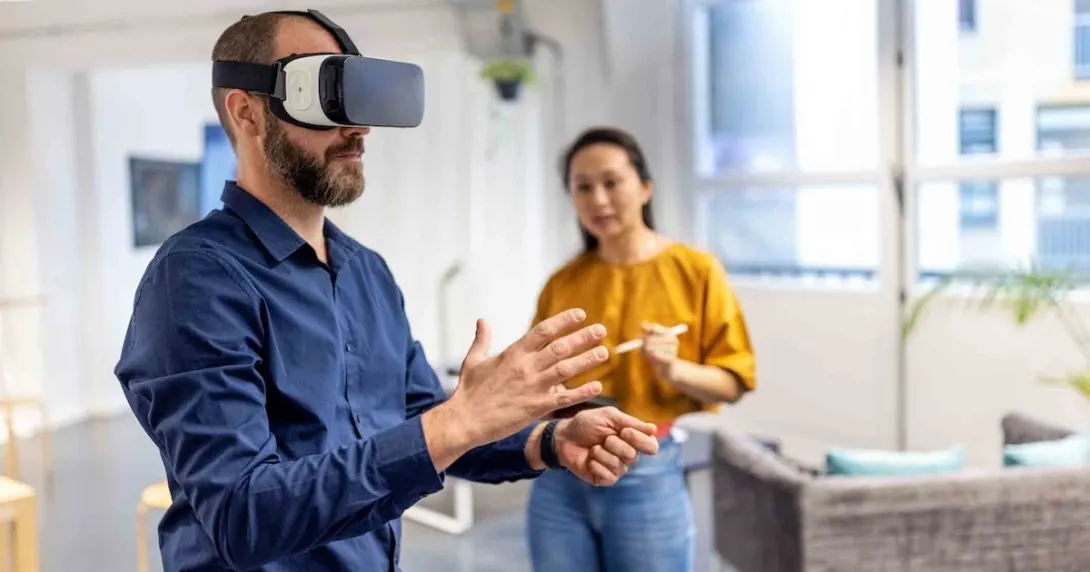
Photo: Luis Alvarez/Getty Image
Boston-based XRHealth, a company offering immersive therapeutics, announced the launch of XR CareCart, a multifunctional virtual reality rehabilitation station aimed at making advanced therapy immediately available in clinics, hospitals and community health environments.
XRHealth's extended reality (XR) platform addresses physical therapy issues such as mobility, balance, range of motion and pain relief.
It also deals with occupational therapy, including rehabilitation, motor skills and daily function support, as well as mental health issues like anxiety, stress reduction, cognitive training and relaxation.
XR CareCart offers a thorough plug-and-play VR therapy system that does not require any IT setup or Wi-Fi access.
It comes outfitted with an integrated SIM-based router and can be deployed on-site, making it suitable for inpatient rehab, outpatient clinics, senior living facilities, veterans' care and mobile rehabilitation programs.
In addition, the XR CareCart comes with two VR headsets, a laptop preloaded with XRHealth's therapeutic platform, a patient-facing tablet and dual monitor arms for clinician viewing that are mounted on a medical-grade mobile cart that can easily move between rooms.
"The XR CareCart eliminates one of the biggest barriers to implementing advanced rehabilitation, IT setup and infrastructure," Eran Orr, founder and CEO of XRHealth, said in a statement.
"Now, any clinic or hospital department can roll in a cart and immediately deliver world-class rehabilitation to patients, wherever they are."
THE LARGER TREND
In August, XRHealth launched a new platform, XRHealth 2.0, designed to simplify how clinicians deliver immersive healthcare and how patients access it.
According to the company, the platform provides patients with immediate access to care and clinicians with therapy management tools under one dashboard by allowing for faster onboarding, more straightforward treatment assignment and greater visibility into patient progress across multiple therapeutic areas.
In July, XRHealth partnered with Kemtai, an AI-enabled computer vision exercise coaching platform, to incorporate motion analysis technology into XRHealth's physical therapy experiences.
Through the alliance, users of XRHealth's immersive experiences will be able to receive real-time feedback, performance scores and clinician-guided instructions on movement during rehabilitation. The offerings will aid patients with orthopedic, neurological and post-surgical conditions.
In March, XRHealth announced its new AI clinician assistant, a customizable avatar that educates patients about their condition and provides guidance.
The XRHealth AI Clinician Assistant was developed to reduce clinicians' burden of performing routine daily tasks, like education, to enhance their capacity to treat more patients.
In February, XRHealth acquired virtual reality digital therapeutics company RealizedCare, which combines digital therapeutics with wraparound virtual services to supply value-based chronic care management.
RealizedCare, formed in 2023 through the merger of virtual reality behavioral health platform BehaVR and virtual chronic care management company Fern Health, was a digital care management platform for chronic pain powered by digital therapeutics.
RealizedCare's offerings were integrated into the XRHealth offerings, which the company said would add scientifically proven methods to its portfolio that help manage chronic pain and behavioral health conditions. It also introduced RealizedCare's triage tool aimed at optimizing personalized patient care.
Last year, XRHealth launched an AI-powered XR platform that integrates AI technology within a comprehensive therapeutic system.
The aim is to allow clinicians to transition between various therapeutic settings for optimized treatment outcomes.
At the center of the platform is the AI generator space, which enables the creation of custom 360-degree environments tailored to individual therapeutic needs.
One feature, for example, allows for the generation of dynamic avatars, using AI and XR to amplify patient interaction and personalization further.


